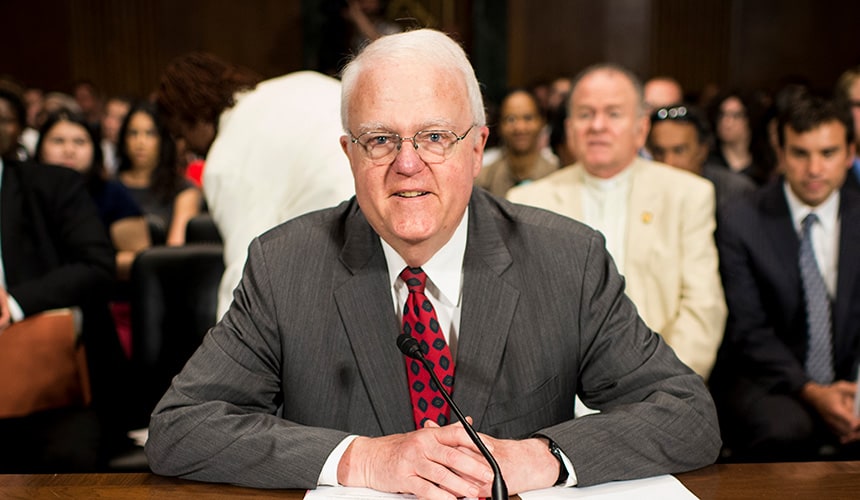
Jim Sensenbrenner
Father of the House
Three months: that’s the margin of difference between Jim Sensenbrenner’s 42 years in Congress and the tenure of Dave Obey BS1960, MA1968, the Wisconsin member with the second-longest length of service.
Of course, when Sensenbrenner started in politics, he had no intention of setting a record for longevity. But he’s well aware of the three months — or, more precisely, 89 days — that separate him from Obey. “I beat out Dave,” he says. Both were first elected to Congress in 1978, Obey in a special election in April, Sensenbrenner in a regular election the following November. Sensenbrenner lasted one term longer.
The record may last a long time.
“I don’t know if anybody’s going to want to stay there for 42 years the way it is now,” Sensenbrenner says.
Though a native of Chicago, Sensenbrenner has deep family ties to Wisconsin. He’s descended from the family that owned Kimberly-Clark, and he grew up in Shorewood, Wisconsin. After earning his bachelor’s degree at Stanford, he went to UW Law School, earned his degree, and soon after was elected to the Wisconsin Assembly. His hardest race, he says, came 10 years later, when he first ran for a seat in the U.S. House of Representatives. Facing off against Susan Engeleiter BS1974, JD1981 in the Republican primary, he won by just 589 votes out of 110,000 cast.
“It was a very tough race,” he says, “and it was probably the last really tough race that I had.”
Over his long congressional career, Sensenbrenner served on a wide variety of committees, including judicial, science, and ethics (which he calls “a penance”). He was one of the few Republicans to support the 1982 extension of the Voting Rights Act, and he was prominent in his support for the Americans with Disabilities Act of 1990. He also served as a House manager in four impeachment trials, including the trial of President William Clinton. “I’ve been a House manager more times than anybody else in the history of the country,” he says.
Sensenbrenner considers balancing security and freedom to be an important part of his legacy. He was in the Capitol on 9/11, and he saw the explosion when a plane hit the Pentagon. “We looked out of the south wing of the Capitol,” he says, “and there was this huge fireball that was maybe six stories high.”
The experience inspired him to push for the REAL ID Act, which sets federal standards for identification, making it harder for people with forged papers to escape detection. Then in 2013, he helped sway his Republican colleagues to support the USA Freedom Act, undoing what he saw as the excesses of intelligence gathering enabled by the USA PATRIOT Act.
But Sensenbrenner was also known for his self-deprecating sense of humor. One of his earliest ads depended on a quote from his wife, Cheryl. “We had a flyer that said, ‘Jim Sensenbrenner is the cheapest man I know! — Cheryl Sensenbrenner,’ he says. ‘Jim is as cheap with the taxpayers’ money as he is with ours. And that’s why you ought to vote for him.’ It worked very well.”
Before the 2020 election, Sensenbrenner decided that his record for longevity added up to enough public service. “I had paid my dues,” he says. “I decided I’m not going to run for public office again.” His nearest current competitor, Ron Kind, had only 24 years in the House, and he retired the following election.
 12° F
12° F